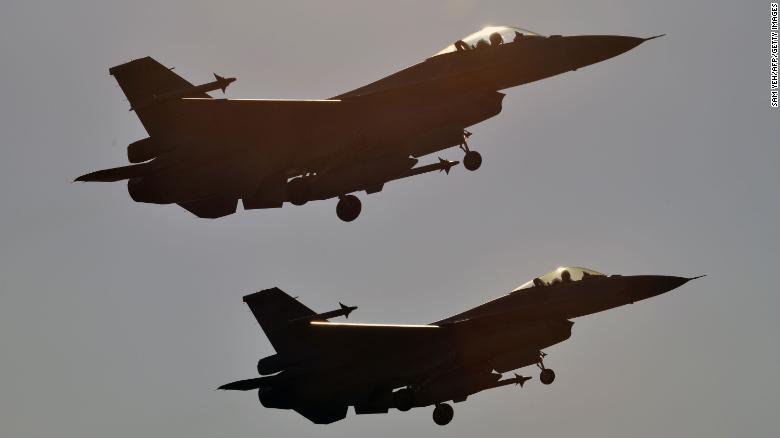Hong Kong Taiwan has grounded its entire fleet of about 140 US-made F-16 fighter jets after one of the planes crashed during a training mission on Tuesday evening.
Taiwan’s Defense Ministry said the single-seat F-16 disappeared from radar screens over the Pacific Ocean just two minutes after taking off from Hualien Air Base, on the self-ruled island’s east coast, at 6:05 p.m. local time.
A search for the jet’s pilot, Col. Chiang Cheng-chih, is continuing, according to a statement from the office of Taiwan President Tsai Ing-wen.
Tsai told reporters Wednesday morning that all of the island’s F-16s would be grounded pending an investigation into the crash.
The F-16s represent about half of Taiwan’s fighter fleet, which has been stretched in recent months as warplanes from China’s People’s Liberation Army Air Force regularly entered the island’s air defense identification zone — prompting intercepts from fighter jets.
China claims full sovereignty over Taiwan, even though the two sides have been governed separately since the end of a civil war in 1949. Last month Taiwan’s defense minister said it had spent nearly $ 900 million this year scrambling fighters against Chinese incursions, Reuters reported.
Despite the grounding, Tsai said Taiwan’s forces would remain ready to defend the island.
“The defense and combat readiness tasks must not be relaxed a bit to ensure national security,” she said.
The F-16s represent one of Taiwan’s key forms of defense against any possible Chinese military actions against it, and Taipei is looking to add newer, upgraded models to its fleet. In August, it finalized the purchase of 66 new F-16s from Washington in the biggest US arms sale to Taiwan in years.
It also launched a new US-backed maintenance center for the fighter jets in the central city of Taichung.
“The time needed for jet maintenance will be greatly shortened and availability will be boosted significantly, ensuring the Air Force’s combat power at the front line,” Tsai said at the time, according to Reuters.
Military aviation analyst Peter Layton, a former Australian Air Force officer now with the Griffith Asia Institute, said Wednesday that the latest crash was not necessarily the result of a mechanical problem.
“Maybe they (the pilots) have been flying all days and no night training,” he said. “This is more common then you might think. The real world often impedes training,” he said.
Tuesday’s accident was the second involving a Taiwanese fighter in a month after one of its aging F-5 planes crashed in late October, Reuters reported.
>>>>

